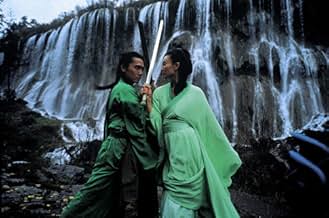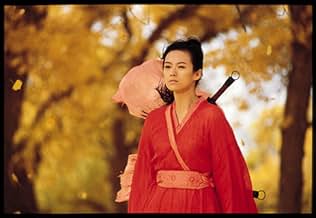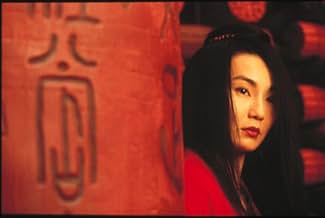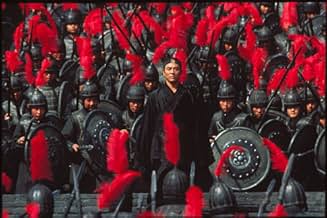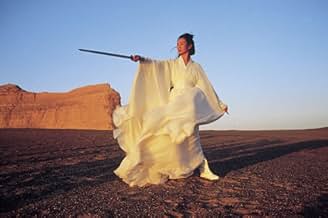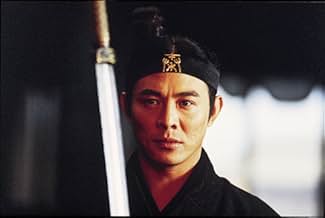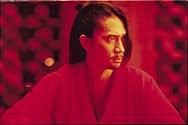Nella Cina di 2000 anni fa, Senza Nome racconta al re di Qin, futuro imperatore, come sia riuscito a sgominare i sicari che lo stesso re gli aveva sguinzagliato contro.Nella Cina di 2000 anni fa, Senza Nome racconta al re di Qin, futuro imperatore, come sia riuscito a sgominare i sicari che lo stesso re gli aveva sguinzagliato contro.Nella Cina di 2000 anni fa, Senza Nome racconta al re di Qin, futuro imperatore, come sia riuscito a sgominare i sicari che lo stesso re gli aveva sguinzagliato contro.
- Candidato a 1 Oscar
- 46 vittorie e 48 candidature totali
- Broken Sword
- (as Tony Leung Chiu-Wai)
- Flying Snow
- (as Maggie Cheung Man-Yuk)
- Moon
- (as Zhang Ziyi)
- King
- (as Chen Dao Ming)
- Scholar
- (as Liu Zhong Yuan)
- Old Servant
- (as Zheng Tian Yong)
- Commander
- (as Zhang Ya Kun)
- Seven Qin Guards
- (as Hei Zi)
Recensioni in evidenza
The imagery is unparallelled, simply draw-droppingly near perfect scenes, with bold and vibrant use of colour, symbolism and scenery. The fluent flow of the storyline, the delicate direction of the sword slicing action, the Chinese cultural concepts and the emotionally charged scenes between characters combine to produce a simply remarkable achievement.
This film has a few elements from Crouching Tiger Hidden Dragon, but is far, far superior in every way. The sleek direction from Yimou Zhang is so perfectly done, just imagine two martial arts experts ensuing in battle against each other, defying the laws of physics as we know it, and yet following them in 360 degrees in slow motion as one deflects a droplet of rain from one sword to the other, at the same time spinning and leaping over water... simply beautiful. The attack sequences are also superbly set, with hundreds of thousands of the King's warriors in formation, simultaneously firing enough arrows into the city which literally cover the sky, in addition to the viewer being able to watch the journey of a single arrowhead aimed during this event. The build up to the attack along with the unnerving tune of a Chinese stringed instrument help you, as the audience, to become firmly engrossed in your seat.
The individual martial arts is also second to none, for myself particularly to see the distant shots of the whole battle sequence showing the true skills involved with fighting, such as footwork, perfect timing,aggression, counter attacks and defence. Jet Li shows he is truly the grand daddy of martial arts. I cannot stress enough how much you need this film in your life.
The colourful imagery imposed by the director will take your breath away with luscious, vivid, bright, wind-blown,draped backgrounds as the setting for the important progression of the story. Even the story itself is brought to the audience in such a way which ensures your undivided attention, as there are twists in the tales and hidden plots which do not develop until the end of the film.Even short individual scenes are memorable due to their sheer awesome display of skill and speed.
This film even holds a political message which is relevant to all times, especially in today's American-lead world dominance. This film has absolutely everything - including an extremely sexy young Ziyi Zhang who simply is the biggest hype to come out of china since SARS.
This film was released in 2002, but this is certainly one of my all time favourites and will probably be the best film I see all year. I have never been more enthusiastic to pursue films in this genre in my life. For more action type enthusiasts who like more gore and violence check out 'Ong Bak', but for people who appreciate a fuller, visionary piece of martial arts filming, this will leave you speechless.
Hero is two sides of a tale as presented by Nameless (Jet Li), a mere Prefect who defeated three deadly assassins, and the King of Qin (Daoming Chen), the man the assassins wished to kill. Nameless weaves his heroic though modest story of how he killed the assassins, but the King remains unconvinced, spinning his own version of how he believed events unfolded.
Director Yimou Zhang takes us through Nameless' story first, spreading the battle sequences thick, allowing them to take their own time. In the King's version, certain battles are then revised, which is remarkably brave considering that some battles are utter fabrications. In one such fictitious fight, in a faultlessly designed set, Nameless and Sky (Donnie Yen) close their eyes and fight out the battle within their minds. Screen time is being spent lavishly on showing how two characters contemplated a fight, whilst fighting each other in a battle that never occurred. It is confusing certainly, but perhaps Zhang wished for his audience to get lost in the plot's design so that they would not question the warrantability of half of the battle sequences, which make up most of the film.
Yet, it is difficult to ponder these details when they are made so utterly insignificant when viewing such a spectacle. The sheer beauty of the battles, the gentle floating of the assassins as they fly around their arenas (which range from a forest full of orange leafed trees, crisp leaves falling down to the ground like rain, to the crystal clear and calm of a mountain lake), the costumes of characters at varying stages in the story line (red for passion, green for youth, white for truth, blue for love), the amazing army scenes which feature thousands of arrows being fired into the sky to create a black cloud that descends right on top of the camera, all these elements combine to produce a faultlessly perfect image on the screen, each frame a worthy photograph that gently reminds you why cinema is the greatest art form of the twentieth century.
And characterisation is not lost in this beauty as one may have feared. Despite the irritating two dimensional performance of Zhang Ziyi as Moon, the other actors carry off fine performances, especially Tony Leung Chiu Wai as Broken Sword and Daoming Chen as the King. Their performances are especially credible as they are often drowning in the memories of the King and Nameless - they need to change slight mannerisms in order to reflect whose mind they are now in.
The script too is of an impressively high standard. The moments of clarity that the warriors feel are experienced by the audience also, and there are some very informed outlooks of the emptiness of warfare, communicating that to achieve peace, sometimes war is the only option. These messages of course seem fitting in our current times, underlining how ancient some of the methods of our governing body truly are.
Hero is undoubtedly a most beautiful and awe inspiring film. What it lacks in plot substance, it makes up for with structure and script. It elaborates on the ground work created by 'Crouching Tiger' and is an experience that I would encourage you to seek out, as long as you are willing to submit to the film and let it guide you through its world on its own terms.
Rating: 4/5
Comprising, but not limited to outstanding duelling with a variety of razor sharp implements and tongues, a kaleidoscopic background of intense colour and beauty, several tangents to keep you on your toes, an immense scale that befits the telling of such a story with an elegance seldom encountered in Western culture when it comes to films of this time and age, buttressed through outstanding performances by the lead actors all round - outstanding.
First of all, I noticed heavy use of Daoist symbols. The five elements were used - one per fight - fire, wind, water, wood, and metal. A message in the film seemed to show the Daoist idea that the harder you try, the worse you do, as Moon did in her fights. On the other hand, if you can go with the Dao (think: Use the force, Luke), you will succeed.
Second, I did not know before watching the film that it was Zhang Yimou's. His films are often critical of the Chinese Communist Party and sometimes have deep allegorical meaning. Some of his films are banned in China. Hero, on the other hand, seemed to be intensely nationalistic. Lately in China, the communist government has promoted nationalism (instead of populist Communist values as they did pre-1976) with a great degree of success. The use of the word "Tianxia" (literally "all under heaven," translated in the movie was "Our Land") seems Confucian and nationalistic at the same time. Although I would have not guessed this film was by Zhang Yimou from the plot or message, the cinematography was unmistakable. Hero eerily reminded me of another film, Yellow Earth (Huang Tudi), which Zhang Yimou did not direct but for which he did the cinematography.
Third, historically, Hero lacked in a few very obvious places. The Qin Emperor, Qin Shi Huang, was legendary for his fear of death and his Machiavellian rule. When his character states that he no longer fears death because of Broken Sword's words and invites Nameless to kill him, he is entirely breaking with the true historical figure of the emperor. Remember, this is the emperor who built an entire terracotta army to protect him from his enemies in death and spent a lot of money and effort looking for the secret to reach immortality. He was known for a Confucian philosophy spin-off known as Legalism, which is very similar to Western Machiavellianism. While his quick mind (or his advisor's) might have figured out Nameless's plot, he would never have hesitated in executing him.
Overall, this seems like a break from the usual genre one would expect from Zhang Yimou. I am not sure exactly what message he is trying to convey with this film, other than an endorsement of Chinese nationalism and perhaps Daoism as well.
Overall, I didn't think the story was that appealing except for the good message at the end, about the good of all being more important than satisfying one's personal vengeance. Well, who could argue with that? As for the rest, perhaps being a Westerner unfamiliar with Eastern culture, it's harder for me to relate to the mind-set. I would be interested to know how Asians viewed this story, as opposed to similar films.
Sometimes I think these wild Crouching Tiger-like action scenes are too long and overdone, but at least in this film they were very original and, once again, more visuals feasts than anything else. On my second viewing, I discarded the subtitles and went with the dubbed version to concentrate more on the stunning look of this film. It paid off. Even if I don't quite follow everything, each scene is such eye-candy that you can't go wrong viewing this.
Lo sapevi?
- QuizThe "red fight" between Moon and Flying-Snow was filmed in a forest in Mongolia. Director Yimou Zhang had to wait until the leaves turn yellow, and hired local nomads to gather even more yellow leaves in order to cover the ground completely. In fact, he was so fanatic about the leaves, that he had his crew separate the leaves into four different "classes" which were each put at increasingly farther lengths from the camera.
- BlooperAt the beginning of the movie, subtitles state that China was divided into seven warring states. At the end, the subtitles then state that "the King of Qin" unified China, without specifying which one. Historically, the king that was the one to unite all of the Chinese states was Ying Zheng (later changed name to Shi Huang Di) who inherited the throne from his deceased father at age 13 (as opposed to the age of the king in the movie). At the time, Ying Zheng began to rule China, the seven states were already reduced to two larger states (Qin and Chu) which was later dominated by Qin when Ying Zheng was 22 years old. It is therefore impossible for the same king shown in the movie to be the king that united all the Chinese states, although the end-note is semantically correct.
- Citazioni
King of Qin: I have just come to a realization! This scroll by Broken Sword contains no secrets of his swordsmanship. What this reveals is his highest ideal. In the first state, man and sword become one and each other. Here, even a blade of grass can be used as a lethal weapon. In the next stage, the sword resides not in the hand but in the heart. Even without a weapon, the warrior can slay his enemy from a hundred paces. But the ultimate ideal is when the sword disappears altogether. The warrior embraces all around him. The desire to kill no longer exists. Only peace remains.
- Versioni alternativeThe Director's Cut was 107:15 minutes, compared to the theatrical version at 96:23 minutes.
- ConnessioniEdited into Ying xiong: Cause - The Birth of Hero (2002)
I più visti
Dettagli
Botteghino
- Budget
- 31.000.000 USD (previsto)
- Lordo Stati Uniti e Canada
- 53.710.019 USD
- Fine settimana di apertura Stati Uniti e Canada
- 17.800.000 USD
- 29 ago 2004
- Lordo in tutto il mondo
- 177.395.557 USD
- Tempo di esecuzione1 ora 47 minuti
- Colore
- Mix di suoni
- Proporzioni
- 2.35 : 1
Contribuisci a questa pagina





